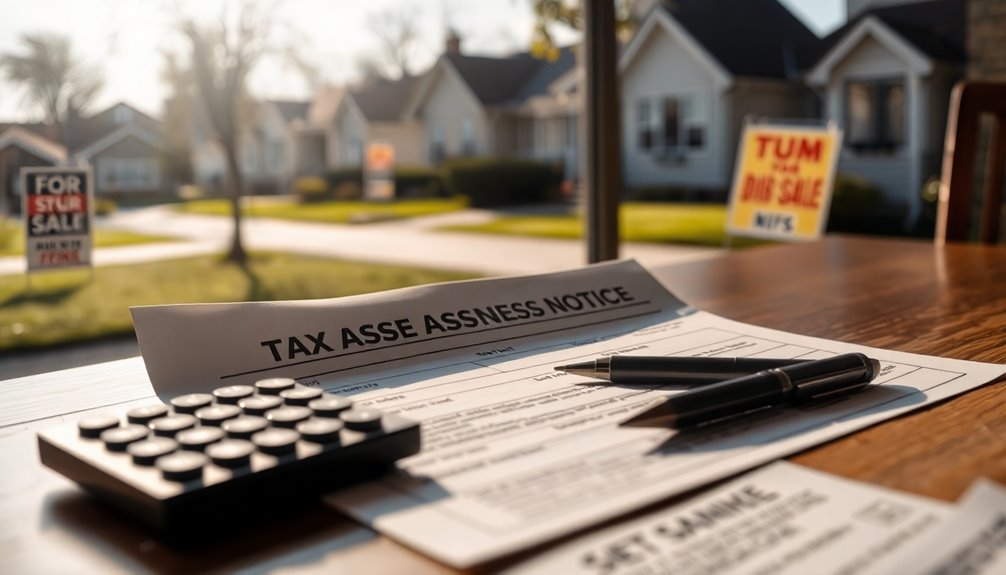To lower your property taxes, start by exploring relief programs like homestead exemptions and circuit breakers that cater to low-income families and seniors. You can also appeal your property's assessed value if it's higher than recent market sales. Gather necessary evidence, such as tax returns and comparisons to similar homes, to support your claim. Familiarize yourself with your state's laws regarding tax limits and deadlines for filing appeals. It's essential to act quickly, as some processes have strict time frames. There's more to discover about successfully lowering your property taxes, so keep going for helpful insights!
Key Takeaways
- Check eligibility for property tax relief programs, such as homestead exemptions and circuit breaker programs, which can significantly reduce your tax burden.
- Research recent sales and appraised values of similar properties to support your case during the assessment appeals process.
- File an appeal with your local county board of review if you believe your property has been overvalued; adhere to all deadlines.
- Gather and present supporting evidence, including tax returns, property deeds, and comparisons with similar homes to strengthen your appeal.
- Familiarize yourself with state laws and tax limitations that may help you understand your rights and potential reductions in property taxes.
Understanding Property Tax Relief

When it comes to managing your finances, understanding property tax relief programs can be a game changer. These programs are designed to ease the financial burden on homeowners, particularly those who are seniors or have limited incomes.
One of the most common types of relief is the homestead exemption, which reduces the amount of your property's value that's subject to taxation. However, it's important to note that these exemptions typically apply only to homeowners, not renters.
Eligibility often hinges on income thresholds and residency requirements, so be sure to check if you qualify. Some programs even offer specific benefits for veterans or agricultural users. Additionally, many states are expanding programs to include non-elderly low-income households, providing more individuals with access to much-needed assistance.
You'll usually need to apply and gain approval to receive these benefits, so staying informed about community outreach efforts is crucial.
These programs can also help address racial inequities in the housing system by lessening property tax burdens on low-income households.
Understanding how these programs function and their potential benefits can significantly impact your finances, providing valuable relief and allowing you to allocate your resources more effectively.
Exploring Circuit Breakers

Many homeowners frequently overlook circuit breaker programs as a viable option for reducing property taxes. These programs aim to make the tax system fairer by limiting your property taxes based on your income. If you're facing a high relative tax burden, a circuit breaker can provide the relief you need, preventing financial overload similar to how an electrical circuit breaker prevents surges.
There are several types of circuit breakers to consider. Threshold circuit breakers offer relief when your property taxes exceed a specific percentage of your income. Sliding scale circuit breakers provide greater reductions for lower income brackets. Each state has its own eligibility criteria, which may vary significantly, with some offering benefits to households earning up to $60,000. Furthermore, these programs can lead to increased homeownership rates in affected demographics, making them an essential consideration.
The benefits of these programs are compelling. They target those who struggle the most with property taxes and can provide post-payment refunds during tax processing. By adjusting your tax liability to align with your financial situation, circuit breakers help maintain an equitable tax system.
Don't overlook this potential avenue for relief; researching local options could significantly lighten your tax burden.
Market Value Decline and Reductions

Property taxes can be lowered significantly if you can demonstrate a decline in your property's market value. This decline occurs when the current market value is less than the assessed value, as defined under Proposition 8. You need to assess the property's market value as of January 1, the lien date.
To initiate the process, request an informal review with your Assessor's Office between January 2 and March 31. Be prepared to submit supporting evidence, like recent sales data or a professional appraisal. The Assessor is required to enroll the lesser of the factored base year value or the current market value, ensuring that assessed value accurately reflects the property's worth.
If the informal review doesn't yield a satisfactory outcome, you can file a formal assessment appeal with the Assessment Appeals Board between July 2 and September 15.
When the Assessor's Office confirms a lower market value, they'll enroll the lesser value as your assessed value. However, keep in mind that property taxes may increase again if the market rebounds, possibly exceeding that standard 2% increase under Proposition 13.
Make sure your documentation is thorough, as detailed evidence of market changes and property condition will strengthen your case.
Remember to act within the specified time frames to ensure your appeal is considered.
State Laws and Tax Limitations

Lowering your property taxes often involves understanding the specific state laws and tax limitations that govern how properties are assessed and taxed. Each state has unique rules in place that can significantly affect your tax bill.
For instance, California enforces a strict 2% cap on property assessment increases, while Florida limits homestead value increases to 3%. In Iowa, property assessments can't rise more than 3%, applied across all properties. Infrequent assessments can lead to tax increases post-reassessment, which may also impact your property tax situation.
Rate limits also play a crucial role. In Ohio, property taxes can't exceed 1% of taxable value, although voters can approve increases. On the other hand, Montana has no assessment limits, allowing taxes to rise with market conditions.
Levy limits are present in states like Colorado, which caps local governments' property tax revenue increases at 5.5%.
Additionally, some states offer specific provisions. For example, Louisiana has reassessment freezes for significant value increases, while California allows seniors to transfer assessed values to new homes.
Understanding these laws and limitations can empower you to explore your options effectively and potentially lower your property tax burden.
Utilizing Homestead Exemptions

A homestead exemption can be a powerful tool for reducing your property tax burden. To qualify, your home must be your primary residence, not a rental or investment property. You'll need to live in the home to be eligible, and some states impose income limits that you must meet. For instance, in Ohio, the limit is $38,600 for 2024. Special categories, such as veterans or disabled individuals, often have enhanced exemptions available.
To apply, check your local property appraiser's office website to confirm eligibility. Gather the required documents, including proof of ownership, your property folio number, and your social security number. Submit your application by the designated deadline—typically December 31st. In many counties, you can even apply online. Additionally, some states require annual renewal of exemption to maintain benefits.
Once approved, the exemption reduces your home's taxable value, leading to lower property tax bills. For example, Ohio offers a $26,200 exemption, which can save you significantly over time.
Senior Citizen Programs

For many homeowners, especially seniors, navigating property taxes can feel overwhelming. However, senior citizen programs can significantly ease this burden. If you're 65 or older in Florida, you might qualify for a senior citizen exemption that offers up to $50,000 off your property's taxable value. Additionally, Florida law offers various exemptions, including a significant reduction for qualifying seniors.
In St. Charles County, MO, seniors aged 62 and older can apply for a tax relief program that freezes their tax amount, provided they apply annually. California residents aged 55 and up can benefit from Proposition 19, allowing them to transfer the assessed value from their original home to a new primary residence.
To take advantage of these programs, you'll need to meet specific eligibility criteria, such as being a permanent resident and occupying the property as your primary residence. In California, you must submit your application within three years of buying a replacement home.
Navigating Assessment Appeals

Navigating the assessment appeal process can feel daunting, but understanding the steps involved is crucial for homeowners looking to challenge their property tax assessments.
Start by filing your appeal at the local level, typically with the county board of review. You can choose between an informal appeal, which involves contacting the assessor, or a formal appeal, requiring a written complaint.
Make sure to pay attention to deadlines, as appeals must be filed within specific time frames. You'll receive notifications about any changes in assessments through local newspapers or by mail.
A formal appeal to the county board is necessary before you can escalate the matter to the State Property Tax Appeal Board or the circuit court.
When considering your reasons for filing, note if the assessor's market value is higher than recent sales or appraisals. Look for discrepancies in assessment ratios and ensure that the information used for your assessment is accurate. Additionally, understanding that property taxes are assessed by local appraisal districts can help clarify the importance of your appeal.
If you believe your property's assessed value isn't uniform with similar properties, that's another strong reason to appeal. Understanding these steps helps you navigate the process more effectively, potentially leading to a reduction in your property taxes.
Preparing Supporting Evidence

Preparing supporting evidence is essential to strengthen your case when appealing your property tax assessment. Start by gathering financial documentation. Submit copies of your federal or state income tax returns and any relevant payment records for real property taxes.
Don't forget to include evidence of deductions you've claimed, along with any necessary income worksheets.
Next, verify your property information. Obtain copies of your property deed and double-check the assessment details on your tax bill for accuracy. Research the assessed values of neighboring homes to identify discrepancies. This is particularly important as household gross income must not exceed $18,000 for tax relief eligibility.
If needed, consider hiring an independent appraiser to support your claim for a lower valuation.
You'll also want to provide personal identification. Submit proof of age, identity, and residency, ensuring all owners and their spouses' information is documented correctly.
Lastly, document any home improvements and make neighborhood comparisons. Keep records of enhancements and compare your home's features with those of nearby properties.
Review past assessments to catch any inconsistencies. By preparing thorough and organized evidence, you'll significantly bolster your appeal and increase your chances of getting your property taxes lowered.
Filing for Tax Reductions

When you're ready to file for tax reductions, understanding the process and requirements is crucial for success. Start by checking your local and state deadlines for filing an appeal, as they can vary significantly. For instance, Georgia allows 45 days, while Cook County, Illinois, has a 30-day window.
Make sure to use the standard appeal form approved by your local government, like PT-311A in Georgia or BOE-305-AH in California. Typically, there's a small filing fee, usually $50 or less.
You can submit your appeal in person, by mail, or online, depending on your county's policies. Remember, your appeal needs to be received or postmarked by the deadline to be valid.
Next, choose your appeal venue. The Board of Equalization is common for residential properties, while commercial cases over $500,000 often go before a hearing officer. Understanding the option to further appeal if initial results are unfavorable is crucial for property owners seeking to contest their assessments.
Prepare your documentation carefully and be ready to present your case during the hearing. If your appeal is approved, you'll see a decrease in your property tax bill. If not, further appeals are possible, including options for settlements with assessors.
Frequently Asked Questions
How Do Property Taxes Affect Home Equity?
Property taxes significantly impact your home equity by being calculated on your home's assessed value.
When property taxes rise, they can eat into your financial resources, reducing your net equity. If you live in an area with increasing property values, you might face higher tax bills, further affecting your equity.
Disparities in assessments can also mean that you pay more than others for similar homes, influencing your ability to build wealth through homeownership.
Can Property Taxes Be Negotiated With Local Authorities?
Yes, you can negotiate property taxes with local authorities.
Start by gathering evidence to support your case, such as comparable property values and any discrepancies in your assessment.
Next, submit an appeal application, providing the necessary documentation.
Attend the hearing to present your arguments effectively.
What Happens if I Miss the Appeal Deadline?
If you miss the appeal deadline, your appeal won't be considered for that tax year.
You'll have to pay the assessed property taxes, which could lead to overpayment and financial penalties. Interest on any unpaid taxes can accumulate, creating a heavier financial burden over time.
It's essential to contact the county assessor's office immediately to understand your options and prepare for the next assessment period.
Don't hesitate to seek professional help if needed.
Are Property Tax Deductions Available for Rental Properties?
Yes, you can claim property tax deductions for rental properties.
If your property is solely used for rental, you can deduct the full amount of property taxes paid.
For mixed-use properties, allocate the deductible portion based on the rental space's square footage.
Remember to report these deductions on Schedule E of your tax return.
Keeping accurate records is crucial, so you can maximize your deductions and ensure everything's documented correctly.
How Often Should I Reassess My Property's Value?
You should reassess your property's value based on your local regulations.
If you live in a state with annual reassessments, like Alaska or Arizona, you'll need to stay updated every year.
For bi-annual or tri-annual states, check every two or three years.
Keep in mind market conditions and changes in ownership can also trigger reassessments, so stay proactive to ensure your property reflects its true value.
Conclusion
In conclusion, lowering your property taxes is possible with the right approach. By understanding available relief options, exploring exemptions, and actively participating in assessment appeals, you can make a significant impact on your tax bill. Don't hesitate to gather supporting evidence and file for reductions when needed. Remember, staying informed about state laws and specific programs can empower you to take control of your property taxes and ensure you're paying only what's fair.









